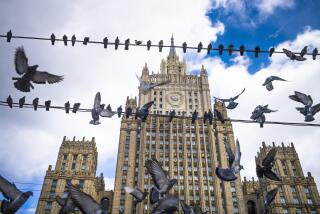Soviets Stick to Hard Line in Israel Visit
- Share via
JERUSALEM — The leader of the first official Soviet government delegation to visit Israel in 20 years repeated Moscow’s hard line toward fully normalizing relations Tuesday as the Kremlin appeared to be sending mixed signals over its intentions.
Israeli Foreign Ministry spokesman Ehud Gol confirmed that, coinciding with the delegation’s arrival, the Soviet Union had stopped jamming Hebrew-language broadcasts by Israel.
Also, state radio reported that two Soviet Jews who had been imprisoned for Zionist activity have received permission to fly to Israel via Bucharest rather than by way of Vienna, which is the normal route. Israeli officials have sought such “direct” flights in order to combat the phenomenon by which about 75% of emigrating Soviet Jews have been “dropping out” in Vienna and diverting to the West rather than coming here.
Israeli government sources, nevertheless, urged caution in interpreting these moves as anything more than temporary aberrations.
An Israeli official noted that the Soviets have stopped jamming state radio in the past for a few days at a time, and that they have occasionally permitted Jews to leave via Bucharest.
Meanwhile, Yevgeny Antipov, deputy director of the Soviet Foreign Ministry’s consular department and leader of the visiting, eight-man delegation, told Israel Army radio that normalization of relations between the two countries could come only after an international conference had succeeded in bringing peace to the Middle East.
Israel’s coalition government is stalemated over whether Israel should agree to such a conference, although both factions in the government agree that Moscow should not be allowed any role in such a meeting unless it first restores ties to the Jewish state that it severed after Israel’s victory in the 1967 Six-Day Middle East war.
Israeli officials have characterized the visit as at least symbolically significant and indicative of a possible change in Kremlin policy.
No Reciprocal Visit
Antipov also took a hard line on another sensitive question, however, saying that there is no place for a reciprocal visit to the Soviet Union sought by the Israeli side. The Soviet delegation is ostensibly here to extend consular services to an unknown number of Soviet passport holders living permanently in Israel and to survey property owned here by the officially sanctioned Russian Orthodox Church.
Most of the Soviet passport holders here are women married to Palestinians who once studied in the Soviet Union, although Foreign Ministry officials said that they also include Soviet Jews who came to Israel before 1967 and who were permitted to retain their Soviet citizenship.
Antipov argued that since Israel has neither property nor Israeli citizens living permanently in the Soviet Union, there is no reason for a reciprocal visit. Up to 800 Soviet Jewish activists have been awarded Israeli citizenship in absentia as a form of protest over Kremlin barriers to emigration, but Antipov said Moscow did not recognize these individuals as Israeli.
The Soviet delegation made its first official call on its Israeli hosts Tuesday, meeting for 35 minutes with consular officials at the Foreign Ministry in Jerusalem.
Ministry spokesman Gol said that the Soviets characterized the session as a “get-acquainted meeting,” and that they stressed that their mission involved only “technical-procedural issues.”
They made no request to see any higher Israeli government official and said they would be back in contact only after spending the next few days “getting organized.”
Antipov told The Times in a brief telephone interview that the delegation expects to begin meeting with Soviet passport holders today at an annex to the Finnish Embassy in Tel Aviv. Finland represents Soviet interests here.
Gol said Israeli Foreign Ministry officials “just listened” and exchanged pleasantries with the Soviets.
More to Read
Sign up for Essential California
The most important California stories and recommendations in your inbox every morning.
You may occasionally receive promotional content from the Los Angeles Times.













